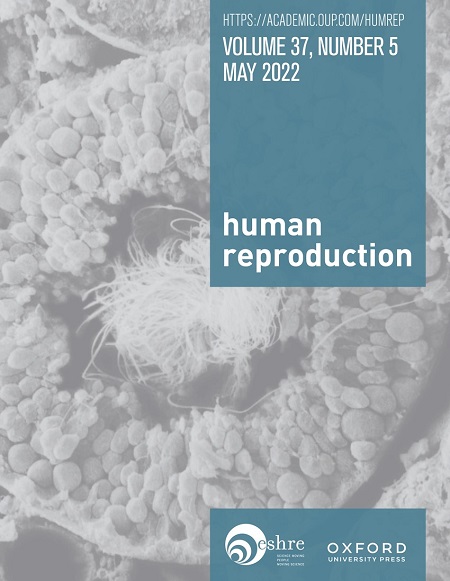P-210 LC3B通过自噬介导母体mrna的衰变,影响ZGA和早期胚胎发育
IF 6
1区 医学
Q1 OBSTETRICS & GYNECOLOGY
引用次数: 0
摘要
LC3B介导母体mrna降解的机制。母体关键mrna降解失败对ZGA和胚胎发育的影响。在早期胚胎中,LC3B与母体衰变mrna结合,并将其携带到溶酶体中降解。已知情况有报道称,在HEK 293T细胞中,LC3B具有RNA结合功能,可促进mrna降解。早期胚胎中母体mrna降解失败导致ZGA启动失败和胚胎发育停滞。本研究首次确定了LC3B在早期胚胎中的表达及自噬活性的动态变化。随后,检测LC3B靶向的mrna。在胚胎中敲低或过表达LC3B,激活或抑制自噬后,检测母体mrna和ZGA基因的表达以及胚胎发育情况。最后,检测母体mrna、LC3B和溶酶体的共定位。这项研究持续了近两年。研究对象/材料、环境、方法选择6-8周龄的雌性和雄性ICR小鼠。收集PN5、早2细胞和晚2细胞胚胎进行RIP测序。设对照组和LC3B敲低组、对照组和LC3B过表达组、对照组和自噬激活组、对照组和自噬抑制组,收集2晚细胞胚胎进行RNA测序。通过体外培养胚胎计算囊胚率。在本研究中,我们发现自噬活性在早期胚胎的不同阶段是动态变化的,晚期2细胞胚胎的自噬活性和LC3B的表达较高。通过对早期胚胎进行RIP测序,我们发现自噬的关键蛋白LC3B可以与母体mrna结合并促进其衰变过程。进一步的实验表明,自噬抑制或LC3B敲低导致母体衰变失败和ZGA失败,而自噬激活或LC3B过表达促进母体衰变和ZGA。我们发现LC3B通过自噬途径介导母体mrna的降解。本研究需要进一步探索LC3B介导的母体mrna降解是否有其他途径,或者是否与母体经典mrna降解途径协同作用。研究结果的更广泛含义在衰老的胚胎中,自噬活性降低。高龄胚胎发育潜能下降的原因可能是母体mrna降解失败,导致ZGA失效,胚胎发育潜能下降。激活衰老胚胎的自噬可以促进胚胎发育。试验注册号本文章由计算机程序翻译,如有差异,请以英文原文为准。
P-210 LC3B mediates the decay of maternal mRNAs through autophagy to affect ZGA and early embryonic development
Study question The mechanism of LC3B mediated degradation of maternal mRNAs. Effects of failure of critical maternal mRNAs degradation on ZGA and embryonic development. Summary answer In early embryos, LC3B binds to maternal decay mRNAs and carries them into the lysosome for degradation. What is known already It has been reported that LC3B has RNA binding function and can promote mRNAs degradation in HEK 293T cells. Failure of degradation of maternal mRNAs in early embryos results in failure of ZGA initiation and arrest of embryonic development. Study design, size, duration In this study, the expression of LC3B and the dynamic changes of autophagy activity in early embryos were identified firstly. Subsequently, the mRNAs targeted by LC3B were detected. After knockdown or overexpression of LC3B and activation or inhibition of autophagy in embryos, the expression of maternal mRNAs and ZGA genes as well as embryonic development were examined. Finally, the co-localization of maternal mRNAs, LC3B and lysosome were detected. The study lasted for nearly two years. Participants/materials, setting, methods Female and male ICR mice aged 6-8 weeks were selected for this study. PN5, early 2 cell and late 2 cell embryos were collceted for RIP seq. Control group and LC3B knockdown group, control group and LC3B overexpression group, control group and autophagy activation group, control group and autophagy inhibition group were set up, and late 2 cell embryos were collected for RNA seq. The blastocyst rate was calculated by culture embryos in vitro. Main results and the role of chance In this study, we found that autophagy activity changes dynamically in different stages of early embryos, and autophagy activity as well as the expression of LC3B are higher in late 2 cell embryos. By performing RIP seq in early embryos, we found that LC3B, a key protein of autophagy, can binding to maternal mRNAs and promotes the decay process. Further experiments indicated that autophagy inhibition or LC3B knockdown leads to maternal decay failure and ZGA failure, while autophagy activation or LC3B overexpression promotes maternal decay and ZGA. We found that LC3B mediates the degradation of maternal mRNAs through the autophagy pathway. Limitations, reasons for caution This study needs to further explore whether LC3B mediated maternal mRNAs degradation has other pathways or whether it is synergistic with classical maternal mRNAs degradation pathways. Wider implications of the findings Autophagy activity is decreased in aged embryos. The reason for the decreased developmental potential of aged embryos may be the failure of maternal mRNAs degradation, which leads to the failure of ZGA and the decrease of embryonic developmental potential. Activating autophagy in aged embryos may improve embryonic development. Trial registration number No
求助全文
通过发布文献求助,成功后即可免费获取论文全文。
去求助
来源期刊

Human reproduction
医学-妇产科学
CiteScore
10.90
自引率
6.60%
发文量
1369
审稿时长
1 months
期刊介绍:
Human Reproduction features full-length, peer-reviewed papers reporting original research, concise clinical case reports, as well as opinions and debates on topical issues.
Papers published cover the clinical science and medical aspects of reproductive physiology, pathology and endocrinology; including andrology, gonad function, gametogenesis, fertilization, embryo development, implantation, early pregnancy, genetics, genetic diagnosis, oncology, infectious disease, surgery, contraception, infertility treatment, psychology, ethics and social issues.
 求助内容:
求助内容: 应助结果提醒方式:
应助结果提醒方式:


